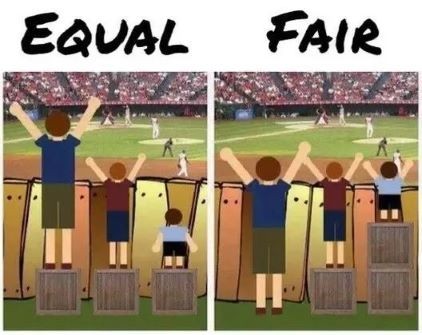On Fairness
I’ll cut to the chase – there is no such thing as being “objectively fair”. Fairness is inherently subjective, i.e. what’s fair for one person is not fair for another.
At workspace, it’s possible to be effective, to be compassionate, to be goal-oriented – but it’s impossible to be fair – at least not to everyone.
State of the matter #
The Gartner survey conducted in 2021 shows that a whopping 82% of employees report their working environment to be unfair. That’s four out of five, an overwhelming majority.
By the way, ignore the advice in the report (the “Four Factors That Help Employees Feel Fairness”), it won’t work. I mean, it’s a good advice, but 82% will not become 40% or even 60%. I highly doubt that even if every company in the world would roll out the support programs, rewards, recognition, access to opportunities, and all other improvements, this percentage would reduce even to 80%. Okay, maybe to 80%.
Another side remark, if you think that the results are only about the compensation, they aren’t. According to another Gartner interview report, 32% believe their compensation is fair, which is already 1.5 times more.
Don’t get me wrong, I’m not saying providing support to your employees is bad advice. I think the world would become a lot better if every company would do that. What I’m saying is that perceived fairness is a shitty metric.
How do we define fairness? #
Let’s browse the blogs!
My first example is from a blog article on being a fair manager. Let’s learn how to be a fair manager together!

Looks like it’s easy, just treat people with respect and… wait a minute – fairness?
Okay, let’s go to Harvard Business Review, and earn a reputation of a fair manager.

Now that we can measure fairness by the process outcome, let’s learn how to measure fairness by looking at the process characteristics!

In conclusion, fairness is when everything is fair. As the famous singer Céline Dion said in her famous My Heart Will Go On, “Love was when I loved you”. Romantic, but a little tautological.
The first example #
All examples are intentionally simplified. Yes, I am aware that the situations at work are way more nuanced.
The reason why I decided to go ahead with these examples is that they are short and illustrate the point without adding too much detail.
Here’s the first example to get you started. Suppose you are a manager in a company and one of your employees, Alice, has worked very hard this year, but objectively the company did not show the expected growth, and you barely have a budget to pay the salary.
Is it fair that Alice gets a promotion and a raise for her hard work? Is it fair Alice doesn’t get that raise, at least until the company results are back on track? If Alice is to get a raise, is it fair that Bob and Carl are laid off to free the budget for that raise?
While you may know the perfect solution, the question is not what solution is the best, but what solution would be perceived as fair by everyone.
How people think about fairness? #
Fairness perception is usually based on:
- Equality, sameness
- Deservedness
- Need
Let’s start with…
Equality #
You can say that equality is not fairness. You can even recall this annoying picture on the internet where three boys stand on three equally-sized boxes trying to see a game from behind a fence.

But is this always so?
Suppose, your company provides a free lunch for the employees. The lunch comes in boxes from a caterer. Every employee can order their box through a company website. As a manager, would you provide all employees to the same choice of food, or would you create some special choices, accessible only to some employees, but not to everybody else? Note, I’m not saying that everyone would get the same food (there are food allergies, dietary restrictions, or simply preferences of every employee). The question is – would you create the same choice for everyone, or would some employees have more choice?
Should the best employees get access to additional more expensive options? Or perhaps should underweight employees get access to larger portions? Many would choose equality here, for ethical and practical reasons.
A negative example: should everyone in the class pass a test, or only the students whose work demonstrated that they have studied the material?
Looks like equality works for some people in some situations. And sometimes it does not make sense at all.
Deservedness #
Fairness is giving all people the treatment they earn and deserve. It doesn’t mean treating everyone exactly the same. That would be unfair, because not everyone earns the same treatment.
– Coach John Wooden
Another basic model of fairness is based on deservedness. The simple examples are: the one who works best should get the most salary, the one who takes the most risk should get the biggest reward in case of a win, and so on.
Many managers genuinely think that this model is objective fairness. What you get is directly proportional to what you contribute, seems fair, right?
Here’s an example to think about. Should a person with a disability get worse treatment at work because they can’t work as hard as the other person who is healthy and energetic? To what extent do you want to apply the deservedness model – for example, should an employee get a salary reduction for the day when they had a headache and could not concentrate?
Need #
Fairness does not mean everyone gets the same. Fairness means everyone gets what they need.
– Rick Riordan
The last popular model of fairness is fairness based on need. It makes a lot of sense in many situations. The best parking spot does not go to your best manager, it goes to the person for whom it’s difficult to walk to the office door. The unlimited international calls package goes to the person who needs to make a lot of international calls, not to the one who performed best in the last quarter.
However, this method is also not bulletproof. For example, should a person who gets tired more at work get more vacation days? There was recently a public debate on whether smokers should get extra break time compared to the rest of the employees.
As a manager, whom should your learning and development efforts focus on: equally for everyone on your team (sameness), more effort and budget for the best performers (deservedness), or for the worst performers (need)?
Equal opportunity #
Some managers believe that fairness is objectively something in between of all three, a so-called “opportunity equity”.
It sounds great on paper. It’s equality, but it’s equality of access to opportunities, and not equality of realizing them. Equal chance for everyone to succeed at their job, receive a promotion, participate in an exciting project – if that’s not fairness, then what fairness even is?
This definition also falls flat once challenged by the real world situations where all combinations of work, personal, and global factors make equal opportunity impossible to practically achieve. Managers will have to disregard some of these factors to be able to make practical decisions.
Some people are born to more fortunate families (and not only in terms of money, but also family values and traditions, conflicts or health issues in the family), some people are born in better places, some people just have genes that are more favourable for certain type of work. Some people live in war-torn countries, while others enjoy peace. Your mother is a scientist, so you have access to a source of knowledge that I won’t have, which would pay off much later, when we solicit for the same position – what is it if not inequality of opportunity?
So what fairness in the workplace really is? #
There’s no such thing as “objectively fair”. No matter what decision you take, there will be always someone finding it unfair.
What does it mean practically for you as a manager? I believe that – and I have to be very careful when I say that – fairness is what you define it to be.
I know, it does not sound right at all, in fact it sounds like an authoritarian nightmare, so I’ll have to explain what this means.
Most certainly, what you do should be based on understanding, empathy, compassion, and basic human rights. However, there are always multiple solutions that are possible to solve the same problem.
It is your goal to define what will be fair in your team, and communicate it continuously, so that people who share your values could join you, and people who don’t could leave before a difficult conflict occurs.
Is it fair in your team to get a promotion after a period of hard work, or is hard work a default expectation? Is it fair to ask an employee to stay after hours to handle an urgent customer request? Is it fair for an employee to ignore the request until an explicit arrangement is made? Is it fair that everyone gets a random place in the open space, or should people with poor eyesight get a place near a window to get better lighting conditions?
Kindness > Fairness #
At workplace, I choose kindness over fairness. It may seem to you that kindness is complementary to fairness, but in fact they often contradict each other.
It may be fair in your team that you can only get a paid day off if you requested it at least a week in advance, and if you didn’t request a day off, then it’s fair that you don’t get it. But if your employee has to urgently fly to another city to help their mother who suddenly got ill, giving them some time off may not be fair, but it’s the right thing to do.
As a manager don’t overrate fairness. Clarity, kindness, effectiveness, and pragmatism go a long way.
■
Here’s a portrait of Céline Dion. Love was when she loved you.
